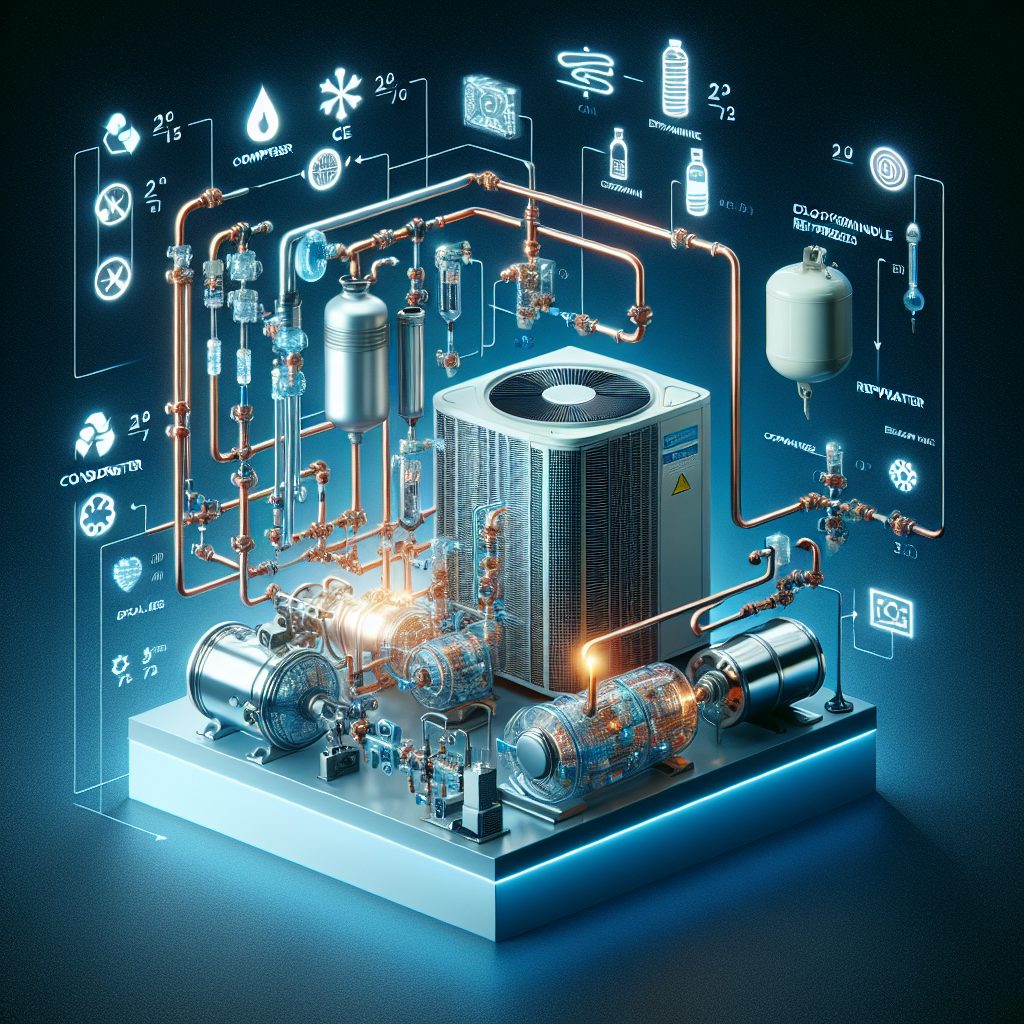
The use of eco-friendly refrigerants in HVAC systems is becoming an increasingly popular option amongst property owners. These types of refrigerants, including hydrofluoroolefins (HFOs) and hydrochlorofluorocarbons (HCFCs) provide optimized energy efficiency, higher performance, and improved safety to systems. In addition, unlike traditional synthetic refrigerants, they have a lower global warming impact and are not ozone-depleting chemiclas.
For HVAC systems, the use of one of these eco-friendly refrigerants may offer better performance than a traditional refrigerant. These refrigerants have been specifically formulated for improved thermodynamic efficiency, which can reduce energy costs. Additionally, these refrigerants put less strain on compressors, leading to higher performance and reliability. Moreover, because they are non-corrosive, they are also safer for use in HVAC systems, which can reduce the risk of expensive repairs and downtime.
Key Takeaways
1. HVAC systems influenced heavily by refrigerants like chlorofluorocarbons (CFCs) and hydro-chlorofluorocarbons (HCFCs) to help them regulate temperatures.
2. After they were deemed to be contributing significantly to global warming by depleting the ozone layer, governments across the world signed the Montreal Protocol to completely phase out the usage of substances like CFCs and HCFCs.
3. Since then, several new types of eco-friendly refrigerants like hydrofluorocarbons were introduced and adopted as an alternative in HVAC systems.
4. HVAC manufacturers are now encouraged to constantly develop more efficient HVAC systems utilising refrigerants of higher energy efficiency ratings.
5. Proper maintenance and regular servicing of engineered, eco-friendly HVAC systems are necessary in order to ensure their safety and energy efficiency.
What Are the Benefits of Eco-Friendly Refrigerants in HVAC Systems?
What Are Eco-Friendly Refrigerants?
Eco-friendly refrigerants are substances used within HVAC systems for the purpose of cooling or heating the air. These refrigerants are more environmentally friendly than their traditional counterparts, as they do not rely on chlorofluorocarbons (CFCs), which are known contributors to global warming and ozone depletion because of their high global warming potential (GWP).
Types of Eco-Friendly Refrigerants
The most commonly used type of eco-friendly refrigerants are hydrofluorocarbons (HFCs), which are synthetic gases that are primarily used in HVAC systems in place of CFCs. They are considered to be much less damaging to the environment than CFCs and will continue to be used as long as they remain a viable option.
Other types of eco-friendly refrigerants include natural working fluids (NWFs), which are derived from carbon dioxide, ammonia, water, and hydrocarbons. These are gaining in popularity, as they typically have a lower carbon footprint than HFCs. Additionally, the recent introduction of hydrocarbon blends has further driven down the overall impact of refrigerants on the environment.
Advantages of Eco-Friendly Refrigerants in HVAC Systems
The primary benefit of using eco-friendly refrigerants in HVAC systems is the reduced impact on the environment. These substances have much lower global warming potential and ozone depletion potential than traditional refrigerants. This, in turn, reduces the overall amount of greenhouse gases produced by the system, resulting in a reduced environmental impact.
Using eco-friendly refrigerants in HVAC systems also helps to reduce energy consumption, as they have a higher thermal efficiency than traditional refrigerants. This means that less energy is needed to cool and heat the air, resulting in lower energy bills for the user.
Finally, the use of eco-friendly refrigerants can also improve indoor air quality, as they do not release dangerous chemicals into the air like their traditional counterparts do. This can lead to improved health for those within the building.
Tips for Selecting Eco-Friendly Refrigerants in HVAC Systems
When selecting eco-friendly refrigerants for an HVAC system, it’s important to consider the following factors:
1.Consider the type of refrigerant needed for the application.
2.Compare the global warming potential and ozone depletion potentials of different refrigerants.
3.Look for a refrigerant with a high energy efficiency.
4.Select a suitable replacement for any existing refrigerants that must be replaced.
5.Ensure that installation of the new refrigerant meets local regulations.
Frequently Asked Questions
What is the Purpose of Eco-Friendly Refrigerants in HVAC Systems?
The primary purpose of eco-friendly refrigerants in HVAC systems is to reduce the environmental damage caused by traditional HVAC refrigerants, such as chlorofluorocarbons (CFCs) and hydrofluorocarbons (HFCs). Eco-friendly refrigerants are designed to reduce the negative impacts on the earth’s atmosphere, animals, and air quality.
What are the Benefits of Eco-Friendly Refrigerants in HVAC Systems?
The benefits of using eco-friendly refrigerants in HVAC systems include increased efficiency, reduced energy consumption, improved air quality, and fewer greenhouse gas emissions. The use of eco-friendly refrigerants also reduces the risks of ozone depletion, which can cause health issues, and contributes to a cleaner environment overall.
What Types of Eco-Friendly Refrigerants Are Used in HVAC Systems?
The most common types of eco-friendly refrigerants used in HVAC systems include hydrofluoroalkane (HFA), isobutene (Isobutane), propane (LPG), and hydrocarbons. These types of refrigerants are designed to be non-toxic and environmentally friendly, while still providing the same performance as traditional HVAC systems.
Are Eco-Friendly Refrigerants More Efficient than Traditional Refrigerants?
The efficiency of eco-friendly refrigerants is comparable to traditional refrigerants. However, because eco-friendly refrigerants are designed to reduce the environmental damage caused by traditional HVAC systems, they may be slightly more energy efficient than traditional refrigerants.
Are There Any Potential Health Risks Associated with Eco-Friendly Refrigerants?
Eco-friendly refrigerants are generally considered safe for human and animal health. However, it is important to ensure that any refrigerants used in HVAC systems are properly and regularly maintained, in order to prevent any potential health risks.
Are Eco-Friendly Refrigerants More Expensive than Traditional Refrigerants?
Eco-friendly refrigerants may initially be more costly than traditional refrigerants. However, in the long run, the use of eco-friendly refrigerants can often save money by reducing energy consumption and improving air quality.
Are All Eco-Friendly Refrigerants Compatible with Existing HVAC Systems?
Some eco-friendly refrigerants will work with existing HVAC systems, while others may require modifications or replacements. Before using a particular type of eco-friendly refrigerant, it is important to consult with a licensed HVAC technician to determine the best options for your particular system.
What Kind of Maintenance is Necessary with Eco-Friendly Refrigerants?
Regular inspection and maintenance is essential with all HVAC systems, including those that use eco-friendly refrigerants. Depending on the type of refrigerant, it may be necessary to make adjustments or replace parts in order to keep the system operating at peak efficiency. Additionally, it is important to regularly ensure that there are no signs of wear or damage, and to check for leaks.
Are Eco-Friendly Refrigerants Regulated by the Government?
Yes, the use of eco-friendly refrigerants is regulated by the Environmental Protection Agency (EPA). The EPA requires HVAC technicians to be certified in the use of eco-friendly refrigerants, and several states have additional regulations in place to ensure the safe and proper use of eco-friendly refrigerants.
What Are the Alternatives to Eco-Friendly Refrigerants for HVAC Systems?
The most common alternatives to eco-friendly refrigerants are HFCs, CFCs, and hydrocarbons. These traditional HVAC refrigerants are known to be harmful to the environment and are being phased out in many areas. As such, it is important to consult with a certified HVAC technician in order to determine the best refrigerant option for your particular system.
Final Thoughts
In the past few years, the use of eco-friendly refrigerants has become increasingly popular. Eco-friendly refrigerants provide numerous benefits, such as improved efficiency, greater air quality, and fewer greenhouse gas emissions. Plus, these types of refrigerants are EPA-regulated and considered safer for the environment.
For anyone looking for a way to reduce their environmental impact, investing in an HVAC system with eco-friendly refrigerants is a great option. It’s important to consult with a certified HVAC technician to ensure that the system is properly installed, maintained, and operated. This will ensure that the system operates at peak efficiency and remains eco-friendly for many years down the line.



